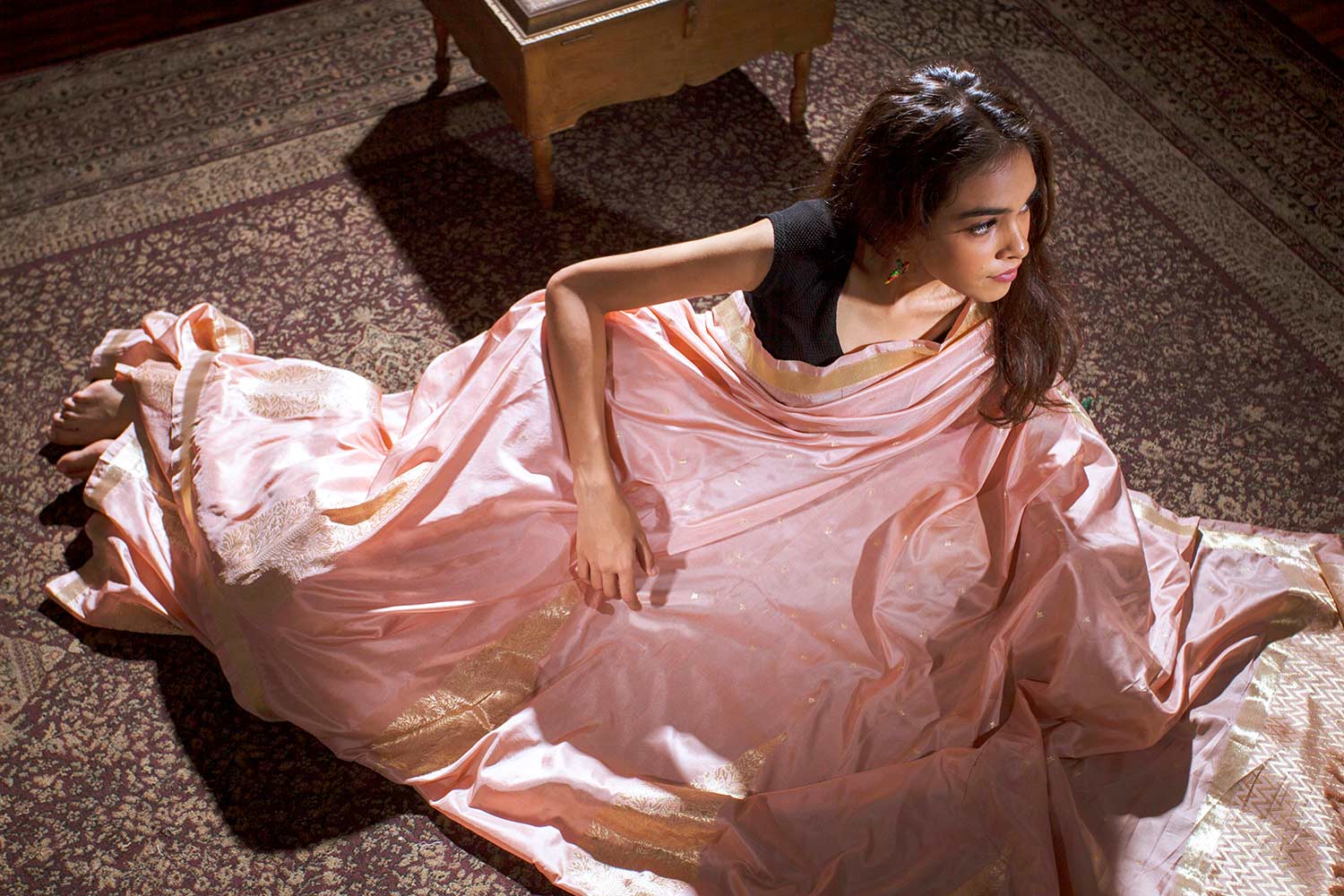
The unsoiled purity of the uncut fabric is symbolic of the pure soul. Here, a pure silk sari in pale pink with stylized paisley motifs in a traditional kadhua Banarasi weave. Photo by Sudhanshu Shandilya
The Ties That Bind
The Fabric of Life – Identity, Sisterhood, Honesty and Purity
By Richa Dubey
Setting up the Loom
My life has been grounded by consistent and centric themes: identity, sisterhood, honesty and purity. One of my early memories is of my mother in a crisp, starched cotton sari that would soften as the day wore on. Another is of playing peek-a-boo in her pallu, using it as a cover for an afternoon nap and even as a hand towel.
Each sari of mine has a story. How it belonged to a sister, an aunt, or a grandmother. Or how it was bought or gifted on a special occasion. And therein lies the heart of my venture, Kajri: the stories of Indian crafts and the people behind them.
You see, in India, crafts were, until recently, an everyday part of life. I remember buying handmade surahis (earthen pots) at the railway to store and cool water for the journey by train. And how colorful, handmade wooden toys were the first purchase on alighting at the Varanasi railway station. Even today, a lot of the scrumptious street food in that city is sold in donas, bowls handmade from dried leaves.
So maybe it’s no surprise that I tend to think of life and business as a fabric of sorts, one that weaves in threads in varying colors and textures. This is the mindset I bring to my new venture.
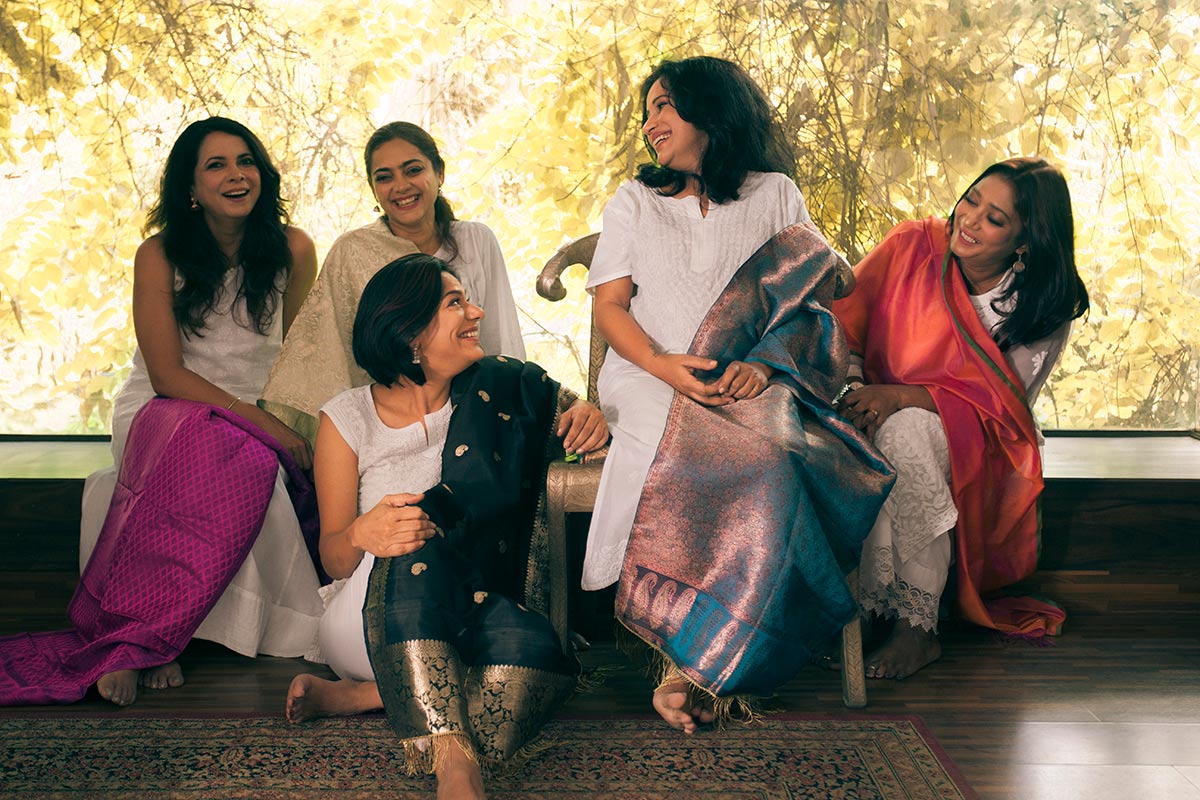
Dubey relied on her sisterhood for everything as she set up her business – from sourcing merchandise to advice on the business plan and branding and even modeling! They were also the inspiration for #kajriheroes – everyday women with remarkable achievements. Photo by Sudhanshu Shandilya
The Warp – Identity
There is no success of any kind if you are not true to yourself. Who you are and how you identify yourself is what roots you, especially in this era of globalization, where many of us integrate multiple identities.
We need something to hold on to in this global flux. However, when an identity overpowers you to the extent that it blinds you to the beauty of other cultures, it drags you back instead of taking you forward. The chairperson of a weaver’s cooperative in India with whom I am co-developing products recently said to me, “We have a rich textile heritage, but if we simply sit on that and don’t reinvent our designs and products, we will not survive in the market.”
The range at Kajri tries to reflect this goal. It takes traditional crafts and casts them into objects for the contemporary world: stoles, scarves and cushion covers instead of just saris; wooden hand-painted pencils, fridge magnets, wall hangings and piggy banks rubbing shoulders with traditional toys; floral waters and essential oils rather than the heavy, traditional ittars (oil-based traditional perfumes). The same is true of any warp of identity – too thin, and it will snap; too thick, and it will create an ugly texture or, worse, not allow the weft to be threaded through.
Photo by Sudhanshu Shandilya
The Weft – Sisterhood
My chosen sisters, the friends of my girlhood – the ones I walked on protest marches with, the ones I stayed up late at night talking with, the ones whose shoulders I cried on after heartbreak and who cried on mine – have been the most powerful influence in my life after the strong women in my family. However, until recently, while I would unhesitatingly turn to them for help in a personal bind (Can you lend me your car for a week? Can you babysit for me – now? I need to vent…), there was a line I never crossed.
Work. I didn’t reach out to them for professional help. Not because they weren’t great at what they did, but because I felt that it would somehow make our relationship transactional, and I wasn’t willing to risk that shift.
That changed with Kajri. I needed a photo shoot, but I couldn’t afford to hire professional models or pay full rates for professional make-up, photography and a studio. I asked my sisters to model for me, and that gave birth to the idea of #kajriheroes – everyday women who have been achievers, often out of the limelight. One of my friends agreed to model for me even though she had not done so for her own brand, Eyaas, which is similar in concept to mine.
Many others agreed to help, as well. My goddaughter was the main model. The venue was a beautiful home volunteered by my mentor and surrogate mom, who also helped me to get discounted make-up rates. The photographer was another friend’s husband, who refused my “payable when able” and installment plan offers and insisted on doing the shoot for free. One of my friends, an entrepreneur, grilled me on my business plan and helped me fix it up. Another, a retail consultant, helped me shape my go-to-market approach and branding.
What I learned from this, after I was reduced to tears by the love and support of my chosen sisters, was that women tend to connect with their closest friends in a different way from men. We tend to rely on each other for social and emotional support, but we don’t reach out to our best friends for professional help as often as we can. This can happen for several reasons: because of deep-rooted social conditioning, which tends to treat friendship and moneymaking as two parallel rail tracks; because we fear to lose or lessen the friendship; or simply because we haven’t thought of it. Only we can change such actions.
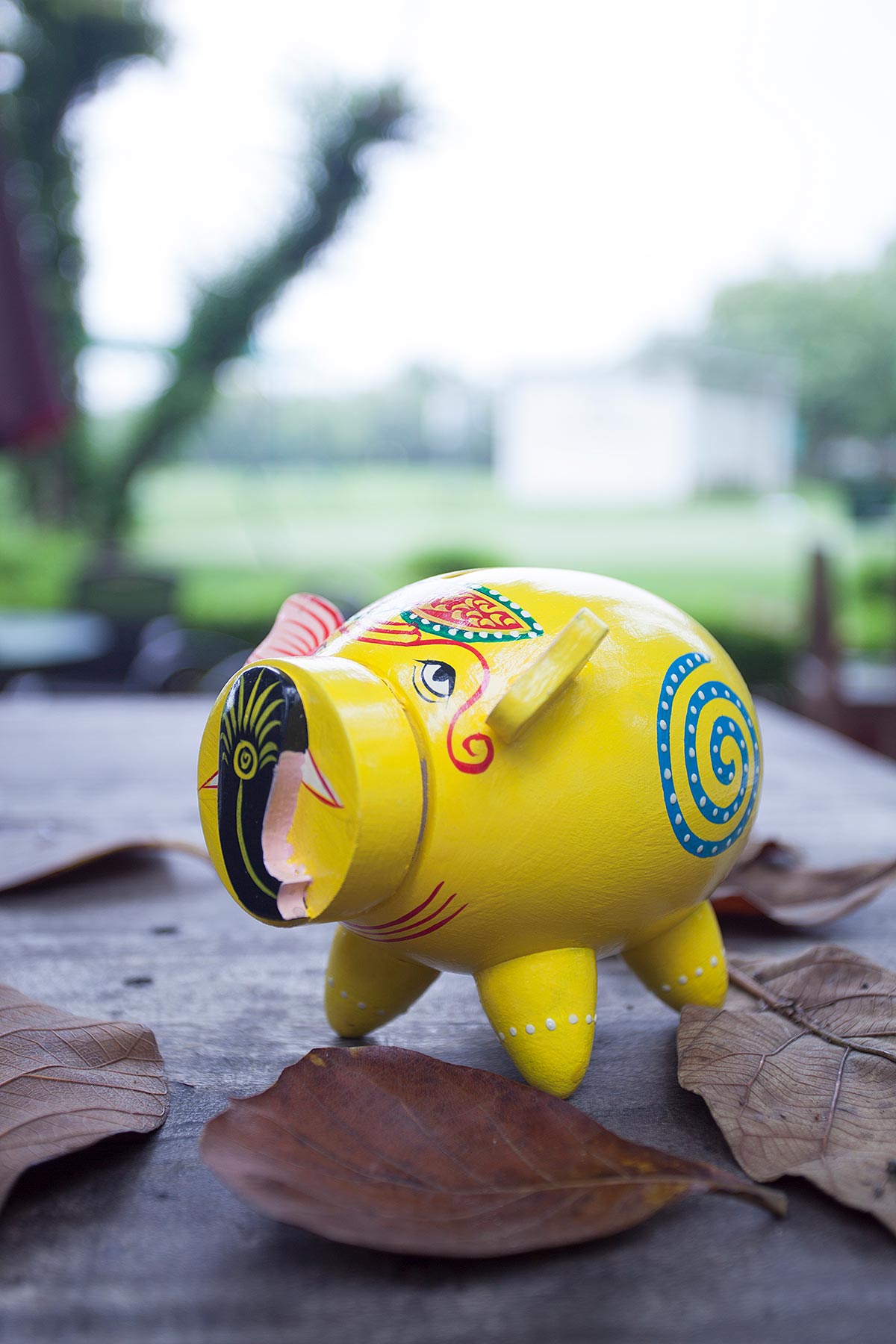
Photo by Sudhanshu Shandilya
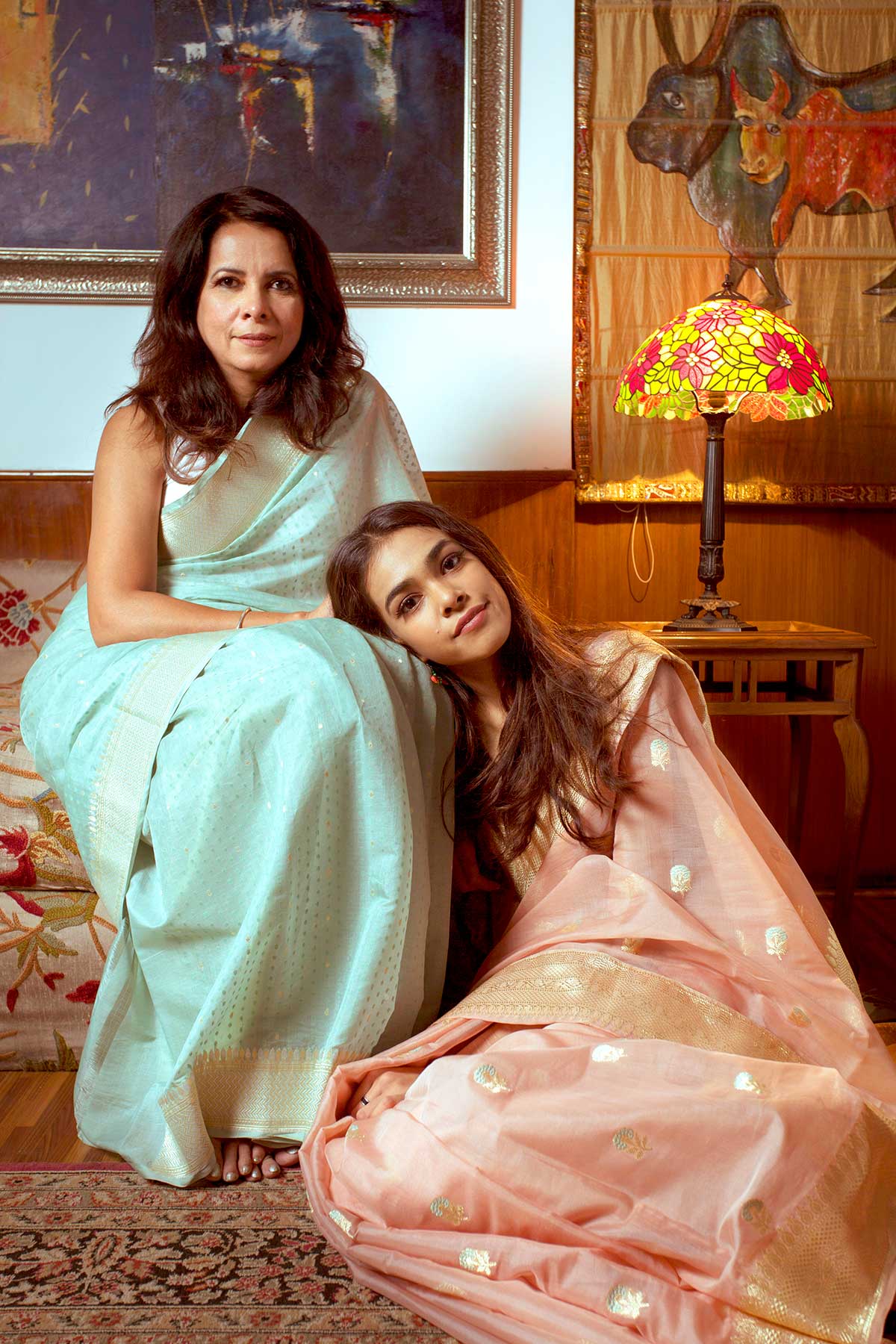
Photo by Sudhanshu Shandilya
After setting up Kajri and sensing a demand in India for its products, I asked my friend at Eyaas if she would handle local shipping for me for a percentage. She refused and said she would do it at cost. This, even though she has a range of products that compete directly with mine. We swap craftsperson details and are currently discussing the potential for pitching into a revival weave together – this in an industry which guards the contacts of good craftspeople as their most precious capital.
The Pattern – Honesty
When a friend recently suggested I bring over ready-to-wear kids’ clothes from India and sell them here in the United States, I was sorely tempted. Easy money is always a lure for a new business. However, machine-made products that don’t celebrate traditional crafts don’t reflect the Kajri brand ethos. My products celebrate not just the crafts but the power of shakti, the divine feminine principle, whether through hand-painted silver earrings depicting the Goddess Kali, destroyer of evil, or through the pure wool stoles made by women’s SHGs (Self Help Groups) in villages in the state of Uttarakhand in India.
I source through a cooperative to ensure that the weavers get as fair a price as possible. I pay double for using guaranteed and tested gold zari (thread that uses a percentage of pure gold) rather than cheaper, synthetic options. I insist on pure silk and handwoven products. I can understand the temptation to compromise, especially as buyers can rarely tell the difference between a power-loomed imitation and the real thing, or between genuine and synthetic zari. But I refuse, not because I don’t like money, but because the idea behind Kajri is to do my bit to support craftspeople.
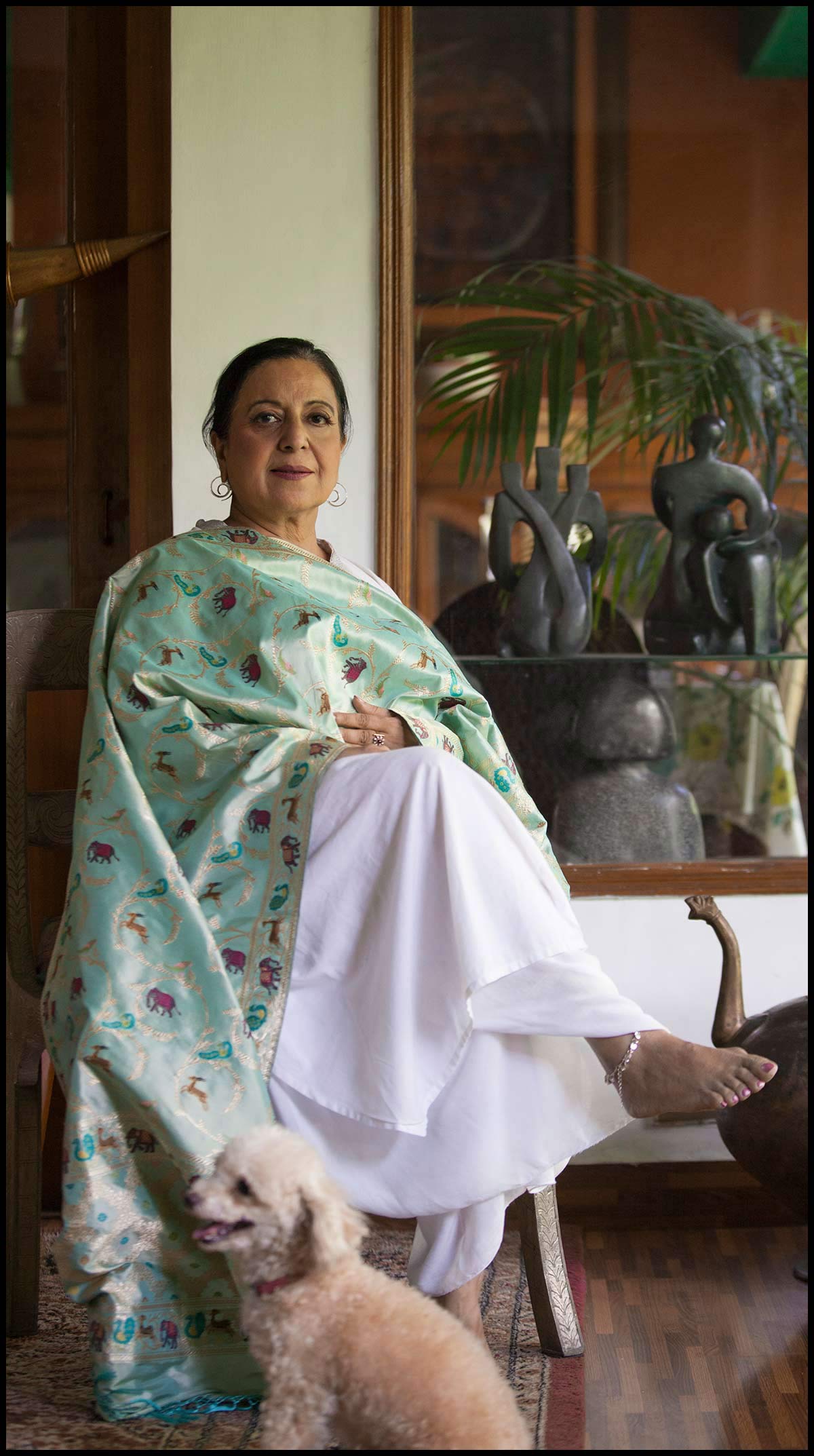
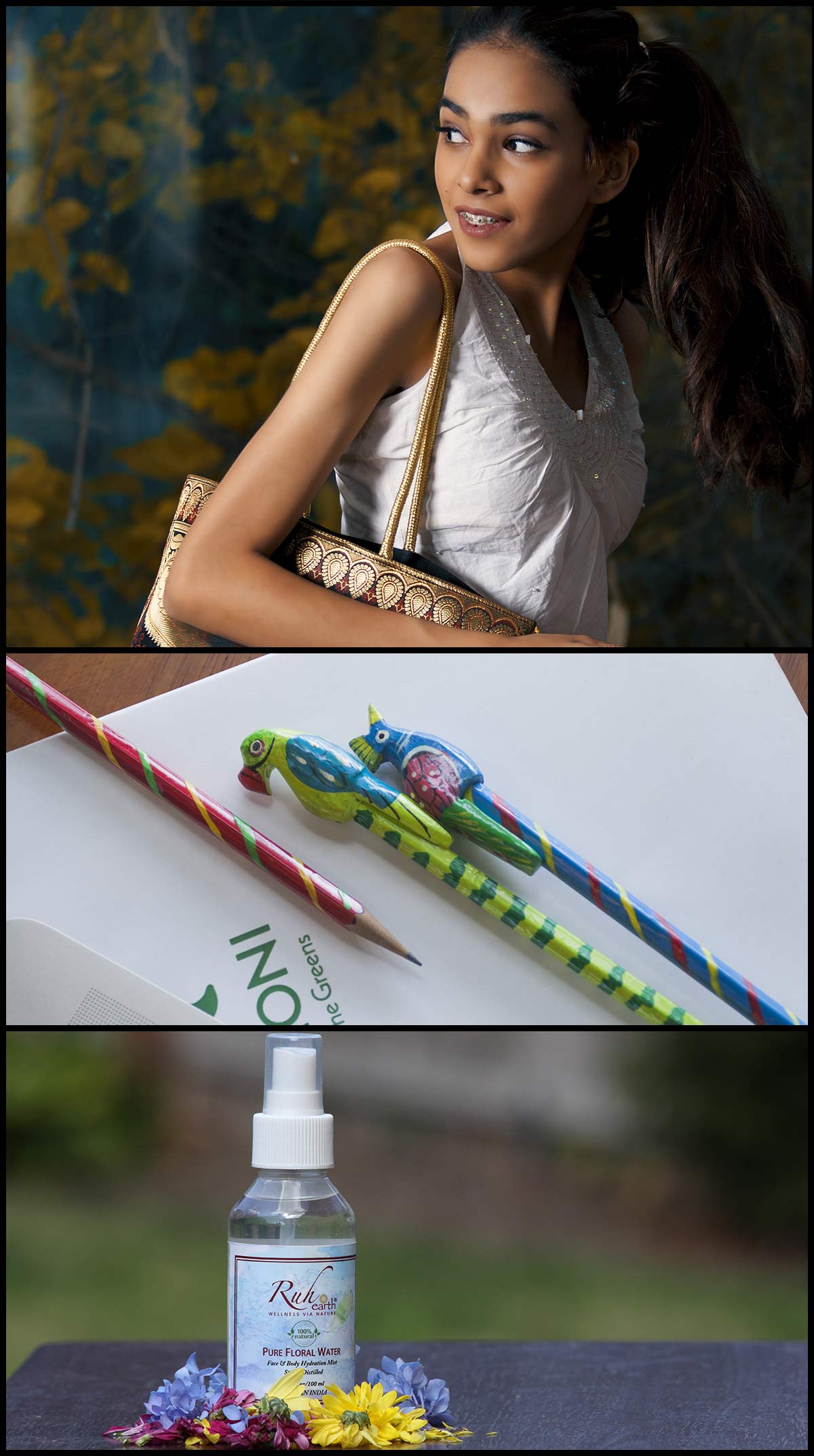
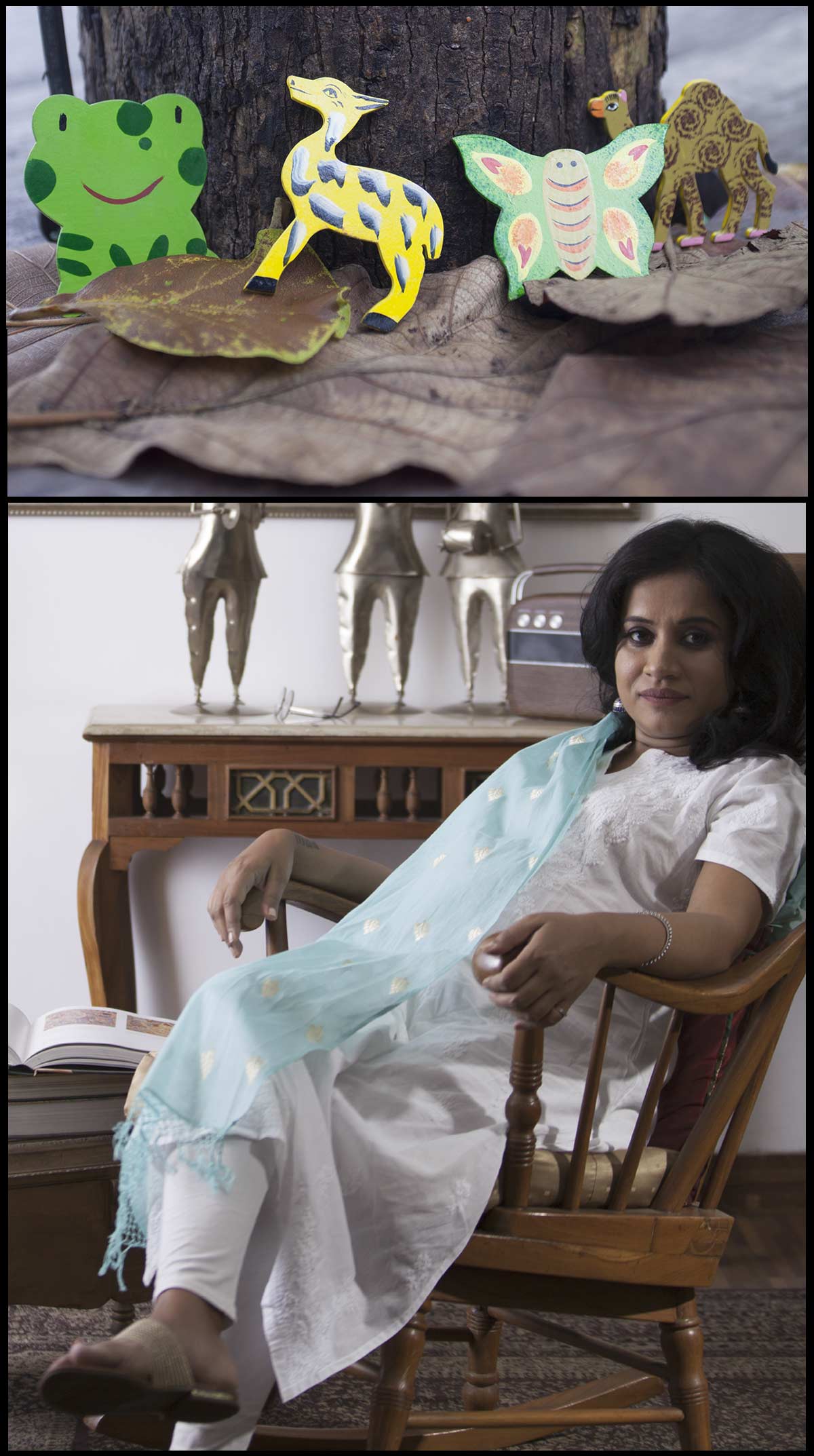
Photo by Sudhanshu Shandilya
The Drape – Purity
What, then, captures the essence of my personal and professional journey? An ideal captured by the 14th-century poet-saint Kabir in his song, Jheeni jheeni beeni chadariya, in which he compares the immortal soul to fabric painstakingly woven by the creator, a common spiritual theme in India. The essence of the song translates thus: When we wear this cloth carelessly, we soil it with our words and actions. Kabir aspires to return the cloth to its maker unsoiled.
While this is a Utopian ideal, of which we must inevitably fall short, it is certainly something worth aspiring to, and the guiding principle for our personal lives and work.
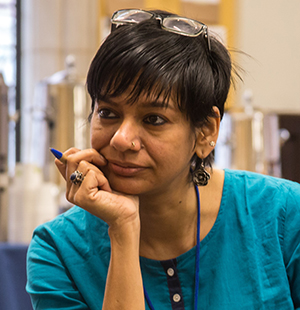
Photo by Eva Cruz
Richa Dubey is a long-time communications and marketing professional, who flirted with television, print, public relations, public affairs and marcomm across a range of industries before she found her true calling in the social impact sector about nine years ago. A campaigner for safer public spaces for all genders, and a passionate advocate of traditional crafts, she enjoys few things as much as connecting with new people and cultures. An army brat who has never lived for more than two and a half years in the same house, she moved from India to the Pacific Northwest with her family three years ago. Her first venture as an entrepreneur, Kajri, marries her love for traditional crafts with her will for positive social impact.
Richa Dubey
Owner
Kajri